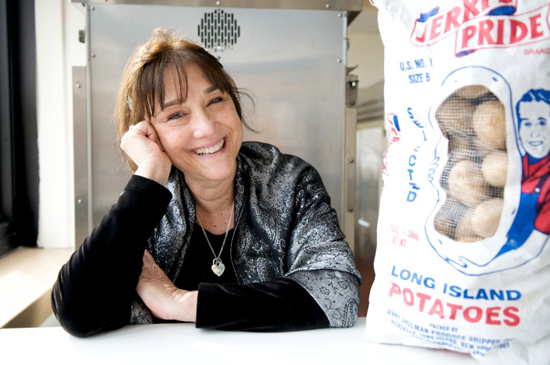No small potatoes: Bay Shore Launches one of the Region’s Largest Farm to School Projects

Janet Sklar pulled together approximately 45 Long Island school districts to purchase local produce, including B size mini-potatoes.
For nearly 15 years, Janet Sklar, a nutritionist with the Bay Shore Union Free School District, has been working to get locally grown produce into Long Island schools. And with the recent purchase of Long Island grown potatoes by nearly 20 school districts, Sklar’s vision has finally come to fruition as one of the largest Farm to School programs in the region. And if all goes as planned, this victory will create a domino effect of celebration, as our children are supplied with healthier lunches and our farmers are supplied with steady demand.
Today, a concept such as Janet’s may seem like such a nutritionally sound no-brainer: feed our kids healthy lunches; keep our farmers afloat; reduce travel and shipment; leave a much smaller footprint on the environment. But it wasn’t always so. “As I sat at my desk in Comsewogue [School District] in 1994, surrounded by local farms, I often wondered why our local distributors were traveling to the Hunts Point Market in the Bronx to bring fresh produce to our schools.” Explains Sklar, MA, CDN, SNS, and the Director of School Nutritional Services at Bay Shore Union Free School District (UFSD). In 1996, she approached the New York State Office of General Services (NYS OGS) to inquire about getting local produce into the schools, but was rebuffed. “They thought it would be too ‘undoable’,” she recalls.
It wasn’t until a by-chance meeting in 2001 with Bob Lewis, Special Assistant for Market Development at New York State Department of Agriculture and Market, that Janet’s efforts began to really take form. With the guidance and assistance of Lewis, the Long Island office of Senator Charles Schumer, Annemarie Garceau Director of Donated Foods at the NYS OGS, and many other politicians and supporters of her cause, Sklar pulled together approximately 45 Long Island school districts into a Co-op that started purchasing local produce last fall, and became one of the largest Farm to School projects in the region.
“This was completely Janet’s brain child!” explains Terri Muuss, Communications Coordinator at Bayshore UFSD. “The district thought it was a wonderful idea and supported her fully in her crusade, but worried with the barriers in place that it could be accomplished. Janet has a lot of energy, though, and when she sets her sights on making something happen, we know eventually it will come to fruition.”
Among the Co-op’s first suppliers is Diane Schulman, owner of Jerry Schulman Produce, the last potato packer on Long Island. Schulman’s product: size B potatoes, packaged in 25 pound bags. Potatoes are low in calories, naturally fat and sodium free, very high in potassium, fiber and contain nearly half of your daily value of Vitamin C. The smaller potatoes have thin skins, which historically made them ideal for use in New York knishes. But it also means they can be roasted without peeling, and they’ve been incorporated into nearly 72,000 school meals so far, with 20 districts ordering 18,000 pounds worth $6500 since it’s inception this past October–a figure expected to grow dramatically.
“As the program grows we will see more local products in our schools; apples, cabbages, squash, melons, berries, spinach, mesculin, etcetera. We will also see the wonderful ‘greenness’ of this program, as reductions in trips to the Hunts Point Market by farmers and vendors (over 175 miles roundtrip), diminish the cost of the middle man and the freshness and nutritional integrity of picked-today, use tomorrow.” Sklar’s passion is evident, “Today, in the richest country in the world’s history, we still have children going to bed hungry. We are seeing children with Type II, adult onset diabetes, coronary artery disease, sleep apnea, hyper-cholesterol, high blood pressure, etcetera, all due to the effects of obesity, poor diets and lack of exercise. All of this can and should be reversible.” Her enthusiasm contagious, “I delight when seeing people, especially children, eating nourishing food!”
Editor’s Note: This story will appear in the forthcoming Spring Issue of Edible East End, out April 15.
Leave a Reply
You must be logged in to post a comment.